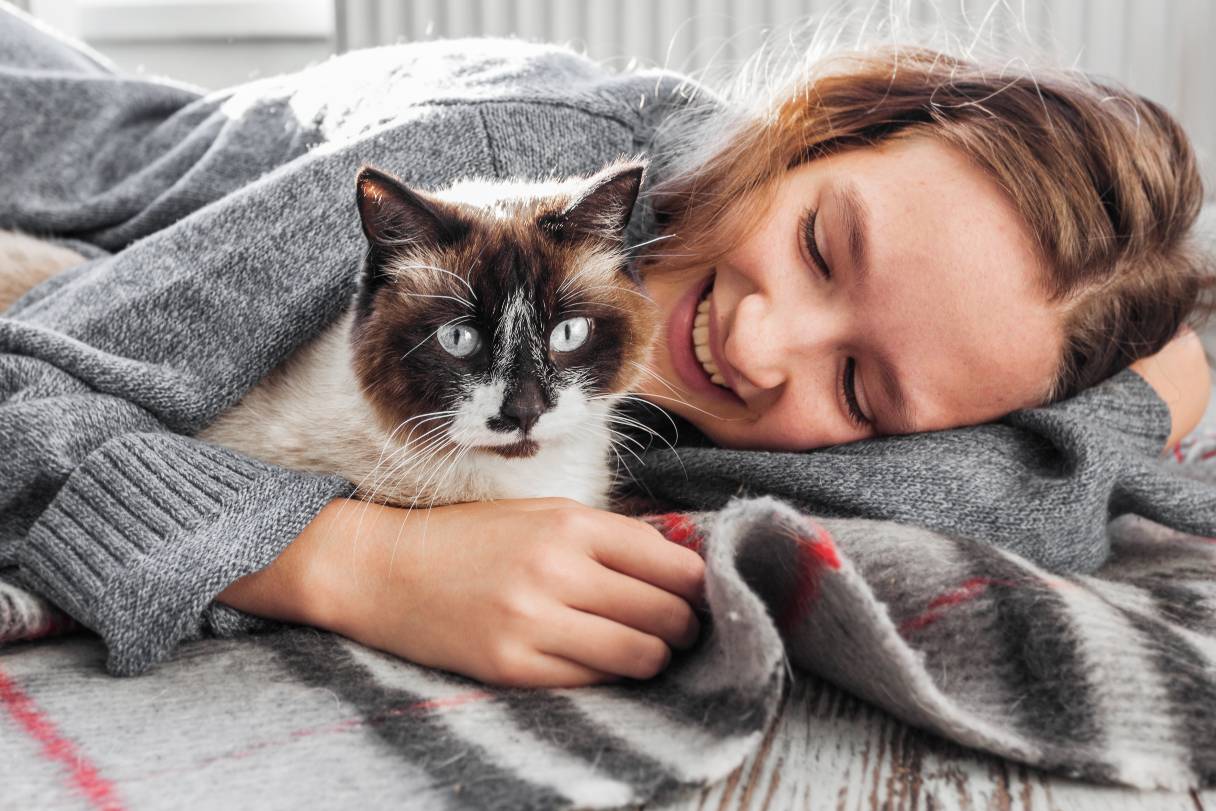There’s something special about a senior cat. They’re set in their ways, they know what they like and they won’t put up with what they don’t. But even more special is the bond you have developed together over the years. Read on for tips on how to help keep your kitty comfortable, managing their senior health and make their golden years truly golden.
What Is a Senior Cat?
In veterinary medicine, the term “senior” generally applies to a pet that has reached the last quarter of its expected lifespan. With cats — who tend to be more long-lived than dogs — 11 years and older is considered to be senior, roughly the equivalent of a human in their late 50s.1 A cat who reaches the age of 15 would be considered geriatric, or "super senior."2
Common Signs of Aging in Cats
Senior cats show signs of slowing down as they enter and move through their twilight years. Lower energy, age-related health issues and joint health problems can all contribute to fluctuations in weight, activity and grooming habits.1 A cat who has been independent and aloof may become more affectionate and attention-seeking, requiring more hands-on care as they progress through their senior years.3
11 Ways to Help Your Senior Cat
Caring for a senior cat can be both challenging and rewarding. Following these tips may help improve your kitty’s overall quality of life as they grow into old age and approach their final days.
1. Feed them proper nutrition
A cat’s nutritional needs can change as they age, and it’s not always as simple as switching to cat food that’s labeled for seniors. Age-related health issues may require a special diet prescribed by your vet. Otherwise, it’s generally best to feed senior cats a quality diet that’s high in protein content and low in calories.4
2. Keep them hydrated
Older kitties are more prone to dehydration. Leave plenty of fresh, cool water for them, stationing different water bowls or fountains around the house near their favorite hangout places so they don’t need to travel far to get it. Switching from dry to wet food and topping it with extra water will also help keep your senior cat hydrated.2
3. Assist them with grooming
Senior cats may struggle to maintain their grooming habits as they once did, particularly as they transition into their geriatric years. Regular brushing will help keep their coats looking and feeling good. Keeping their nails trimmed and brushing their teeth will also help them stay healthy and comfortable.1
4. Provide peace and predictability
Cats become less tolerant of changes, disruptions and loud noises as they get older. Senior cats should have a safe, quiet place where they can escape to hide and nap in peace.1
It’s also important to keep their routines consistent and their surroundings familiar. This is especially important for aging cats with vision and hearing loss, as well as those with dementia.3
5. Make them cozy and comfy
Provide plenty of soft, warm places where your kitty’s aging body will have an easier time getting comfortable.3 A heated bed, or a heating pad wrapped in a blanket or towel to prevent burns, can also feel good on aching bones and joints.4 If possible, provide a comfy spot near a window where they can enjoy watching the world go by from their lazy perch.
6. Encourage playtime and activity
While they may relish their sleep time, senior cats still need play and exercise. Physical movement will help them maintain flexibility and a healthy weight. Also, mental stimulation can help combat cognitive decline in aging cats. Just be mindful of their declining physical abilities and adjust your style of play with them accordingly.5
7. Keep things low and close by
Keeping food and water, litter boxes, beds and toys close together in a relatively small section of the home will make things easier for arthritic cats and put less stress on their bodies. Similarly, it's a good idea to keep their necessities low to the ground and provide ramps to lounging areas that are higher up, so they don’t have to jump or climb. A good litter box for senior cats will either have low sides or a low opening on one side that’s easy for them to step over.3
8. Supplement their nutrition
Senior cats can benefit from extra omega-3 fatty acids to support their joints and coats. Glucosamine can also help cats with arthritis and other joint health issues, and probiotics can help support healthy digestion.4
If your kitty has any particular health conditions, you should talk to your vet about supplements to help treat their condition, but supplements should only be given to your senior cat under your vet’s supervision.
9. Provide support as they go through changes
Along with changes in energy and mobility, senior and geriatric cats might also experience changes in their hearing, vision and cognitive abilities.1 In addition to the above tips to keep things contained, consistent, predictable and accessible, be mindful of changes in how you communicate with your blind or hard-of-hearing kitty. For example, talk to your vision-impaired kitty to let them know you’re approaching them, or use lights and smells to rouse a deaf cat and keep from startling them.6
10. Spend time with them
Your kitty’s golden years are an opportunity to create golden memories. While some cats become more withdrawn and standoffish as they age, many senior cats grow more affectionate and want to spend more time near their people.3 Give your kitty as much love and affection as they’re comfortable receiving, and make an effort to engage in the things they enjoy, such as napping together on the couch. Use this time to take lots of pictures and create memories you’ll cherish long after they’re gone.
11. Find a good vet for support
Health checks and screenings every six months will help your vet catch any underlying illnesses.3 It’s important to find a vet with whom you and your kitty have a good rapport, as they’ll be able to guide you through the challenges of caring for a senior cat. A good vet will also support you through the end of your cat’s life, from helping you determine their quality of life and whether it’s time to stop treatments and move on to end-of-life care, to giving your declining kitty a peaceful departure through euthanasia.
Caring for Your Aging Cat
Whether your kitty remains healthy and spry well into their geriatric years, or they suffer from health issues that make their senior years a struggle, the main goal is to keep them as healthy and comfortable as possible for as long as possible. In addition to the above tips, it’s also a good idea to report any changes in your senior kitty’s health or behavior to your vet so they can diagnose and treat them swiftly, increasing the likelihood of better outcomes. Minding your senior cat’s health, nutrition and comfort, as well as giving them lots of love, will go a long way toward making their final months and years enjoyable and rewarding for you both.
CareCredit Credit Card Financing for Cats
The CareCredit credit card is an easy way to pay for your cat’s annual checkups, food and products at veterinary practices in the CareCredit network.* Use our Acceptance Locator to find a veterinarian near you that accepts CareCredit to help keep your pet healthy and happy for a lifetime of love. CareCredit is there for you and your pet every step of the way; continue your wellness journey by downloading the CareCredit Mobile App to manage your account, find a provider on the go and easily access the Well U blog for more great articles, podcasts and videos.
In addition to pet care, you can also use your CareCredit credit card for dentistry, cosmetic, vision, hearing, health systems, dermatology, pharmacy purchases, spa treatments and so much more within the CareCredit network. How will you invest in your health and wellness next?
Author Bio
Jean Marie Bauhaus is a freelance writer and novelist who has been writing pet content since 2013. Her work has appeared on Forbes.com, Hill's Pet, Chewy, AKC.org and more.







